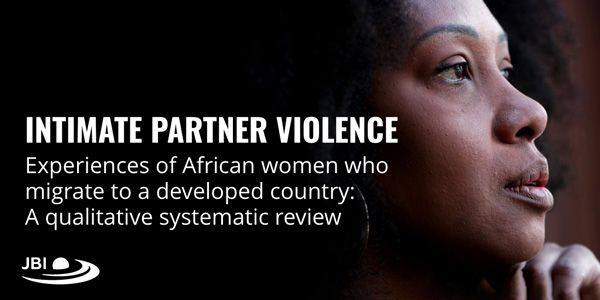
Intimate Partner Violence Crisis Among African Migrant Women
New research helps to break the “cone of silence”
International Women’s Day 2025 asks us to “imagine a gender equal world. A world free of bias, stereotypes, and discrimination. A world that’s diverse, equitable, and inclusive.” New research which highlights the plight of African migrant women facing intimate partner violence is both timely and imperative. It underscores the urgent need to accelerate action for culturally informed and targeted policy action to prevent domestic violence and aid survivors of intimate partner violence within this at-risk population.
The qualitative systematic review, Experiences of African women who migrate to a developed country and encounter intimate partner violence, explains how intersecting cultural norms, migration stressors, and systemic barriers intersect to create a perfect storm of vulnerability and trap women in cycles of abuse.

The United Nations warns that "women and girls of African descent face intersecting and multiple forms of discrimination" impacting health, economic security, and access to justice. Without intervention, these systemic failures risk normalising violence and continuing cycles of vulnerability and violence within growing migrant populations. This population is projected to increase amid climate crises and global instability, according to the World Economic Forum.
Qualitative systematic review methodology is uniquely suited for understanding the "nuanced and multifaceted aspects” of the experiences of these women and associated social, cultural and psychological factors. This qualitative systematic review amplifies the voices of this marginalised and vulnerable population, breaking the “cone of silence”, and allowing the deeper understanding necessary to inform effective, culturally sensitive support for African migrant women encountering intimate partner violence.
Deeply ingrained patriarchal norms contribute to the prevalence of lifetime intimate partner violence rates, ranging from 31% in Nigeria to a high of 80% in Uganda: “Culturally, we’re required to be submissive. Defying this brings more violence,” one of the study participants shared.
For many, migration brings hope for a better future, but it has also introduced profound social isolation and economic dependence. The loss of traditional support networks leaves them vulnerable: "I had no one to turn to. I didn’t even know where to go for help. In my country, my mother and sisters would have supported me, but here, I was alone."
Accessing healthcare can become a significant hurdle. The World Health Organization reports that migrant women often face obstacles including language barriers and discrimination when seeking medical care. These challenges are compounded by cultural expectations that discourage women from speaking out: "Back home, you don’t air your dirty laundry. I was raised to endure”.
Leaving behind familiar support networks, many women find themselves dependent on their partners:
“I had no working permit; my husband, he arranged it for me to go work at a hair salon, but the owner gave to him the money I earned; he told me the owner could only pay him since I was not legal. I could get arrested. I could not open a bank account.”
The fear of law enforcement further discourages these women from reporting abuse: "If I go to the police, they will not believe me. They will say I am making trouble. My husband knows this, and he tells me I have no rights here."
Such experiences highlight the systemic inequalities that make escaping violence particularly difficult for migrant women.
"Policymakers must address institutional complicity, not just individual perpetrators,” the review’s authors urge. Several key strategies to combat domestic violence and support survivors of intimate partner violence are recommended. The authors hope that this qualitative systematic review provides a roadmap for policymakers and advocates working to prevent intimate partner violence, and provides culturally sensitive, targeted interventions to support African migrant women.
The qualitative systematic review is open access and available at:
Ogunsiji, Olayide; Foster, Jann; Green, Heidi; Sikhosana, Nqobile; Gauci, Patricia; Kayesa, Naomi; Fernandez, Ritin
JBI Evidence Synthesis. 23(2):333-364, February 2025.